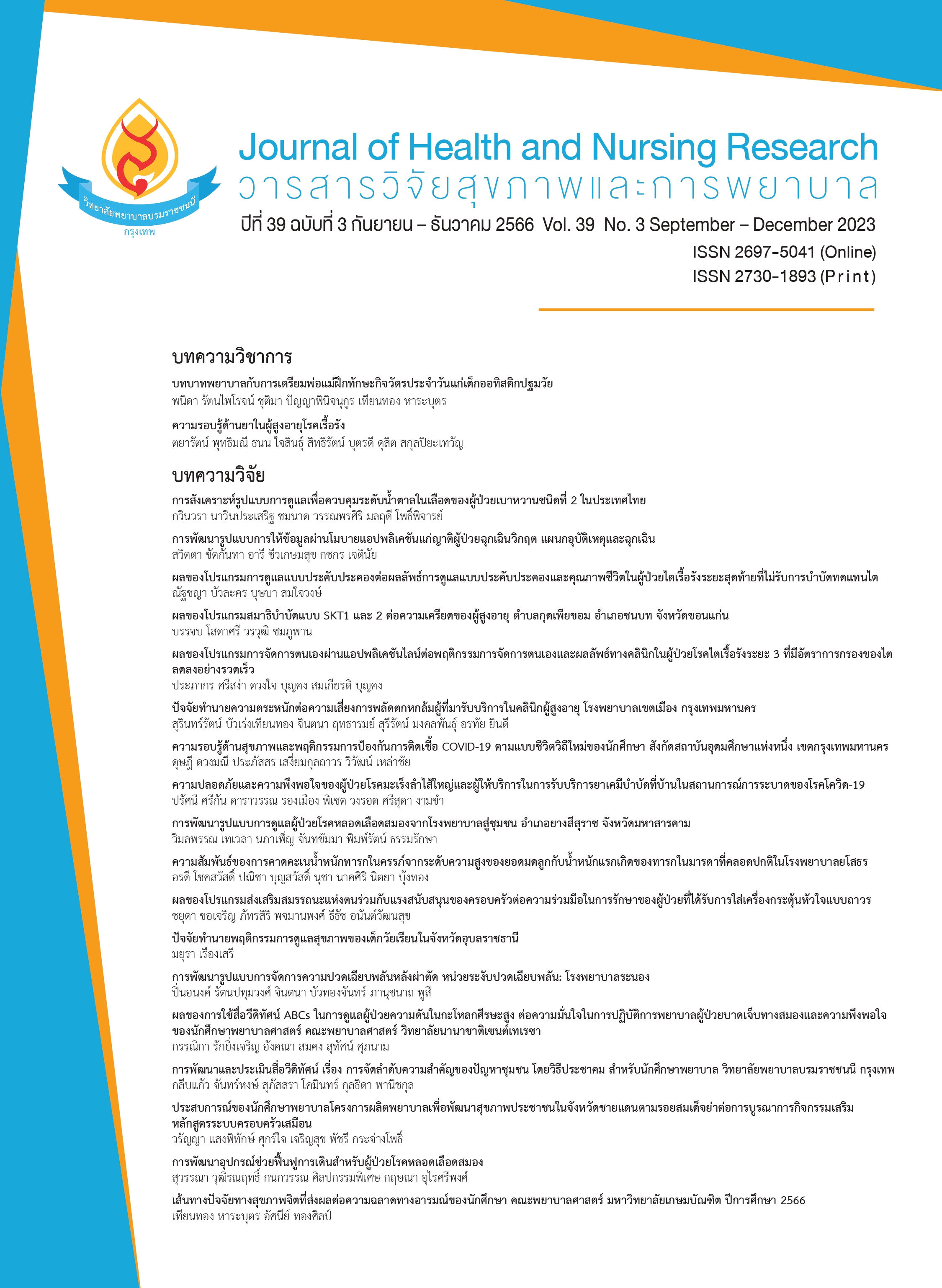ความรอบรู้ด้านยาในผู้สูงอายุโรคเรื้อรัง
คำสำคัญ:
ความรอบรู้ด้านยา , ผู้สูงอายุ , โรคเรื้อรังบทคัดย่อ
บทนำ: ผู้สูงอายุส่วนใหญ่เจ็บป่วยด้วยโรคเรื้อรัง ทำให้ผู้สูงอายุมีการใช้ยาหลายชนิด เพื่อควบคุมหรือรักษาอาการของโรคไม่ให้รุนแรง ทั้งนี้อาจมีปัจจัยอื่น ๆ ที่นำมาสู่อาการไม่พึ่งประสงค์จากการใช้ยา ได้แก่ อายุ ระดับการศึกษา การรับรู้ความรุนแรง การรับรู้ประโยชน์ การสนับสนุนทางสังคม และความรอบรู้ด้านยา เป็นต้น ซึ่งความรอบรู้ด้านยาเป็นปัจจัยที่สามารถจัดกระทำเพื่อทำให้เกิดการเปลี่ยนแปลงเกี่ยวกับพฤติกรรมการใช้ยาที่เหมาะสมในผู้สูงอายุโรคเรื้อรังได้โดยตรง
วัตถุประสงค์: เพื่อให้บุคลากรทางด้านสุขภาพเห็นความสำคัญและแนวทางการส่งเสริมความรอบรู้ด้านยาในผู้สูงอายุโรคเรื้อรัง
ประเด็นสำคัญ: การใช้ยาหลายชนิดในผู้สูงอายุ ส่งผลกระทบทั้งทางด้านร่างกายและจิตใจ มีความจำเป็นอย่างยิ่งในการส่งเสริมความรอบรู้ด้านยา ปัจจัยที่มีผลต่อความรอบรู้ด้านยาในผู้สูงอายุ แนวทางการจัดการใช้ยาในผู้สูงอายุ และการประยุกต์ใช้ความรอบรู้ด้านยา เพื่อลดความรุนแรงจากการใช้ยาที่ไม่ถูกต้อง
สรุป: การส่งเสริมความรอบรู้ด้านยาในผู้สูงอายุโรคเรื้อรัง จะช่วยป้องกันและลดการเกิดภาวะแทรกซ้อนจากการใช้ยาในผู้สูงอายุ ส่งผลต่อการมีสุขภาพและคุณภาพชีวิตที่ดี
ข้อเสนอแนะ: นักวิจัยสามารถนำความรอบรู้ด้านยาที่นำเสนอไปศึกษาวิจัยต่อยอดพัฒนาโปรแกรมการส่งเสริมความรอบรู้ด้านยาในผู้สูงอายุโรคเรื้อรังในอนาคต
Downloads
เอกสารอ้างอิง
Khezrian M, McNeil CJ, Murray AD, Myint PK. An overview of prevalence, determinants and health outcomes of polypharmacy. Journals Sage pub 2020;11:1-10.
Inthana J, Pannarong K, Taweethanavanich Y, Yatniyom P, Sirisupjanan L. Promoting safe drug use in the elderly: a practice guide for nurses. Journal of King Mongkut's College of Nursing Phetchaburi Province 2023;4(1):17-32. (in Thai)
Panyatorn K, Buengmum N, Suwan P, Kwanmom N. The relationship between basic factors, health status, attitudes about drug use and drug use behavior of the elderly with chronic illnesses. Ban Nong Takai, Nong Phai Sub-district, Mueang District, Udon Thani Province. Journal of Nursing and Health Care 2023;38(2):92-100. (in Thai)
Qu J, Zhou T, Xue M, Sun H, Shen Y, Liu Y. Relationship Between Medication Literacy and Frailty in Elderly In patients With Coronary Heart Disease. Original Research 2021;12:1-7.
Suppiah S, Tan YW, Cheng GH-L, Tang WE, Malhotra R. Mediators of the association of limited English health literacy with medication non-adherence among Singaporean elderly. Ageing Research & Education 2020;29(1):25–32.
Gentizon J, Hirt J, Jaques C, Lang PO, Mabire C. In-struments assessing medication literacy in adult recipients of care: A systematic review of measurement properties. International Journal of Nursing Studies 2021;113:103-785.
Rungsawang S. Factors related to polypharmacy medcaiton adherence among older person with chronic illness. Journal of nursing, Siam University 2017;18(35):6–23. (in Thai)
Mairas J, Pan-uthai S, Suwanmanoran, N. The relationship between drug literacy and medication adherence in the elderly with multiple chronic diseases. Journal of Bamrasnaradura Infectious Diseases Institute 2023;16(2): 25-36. (in Thai)
Nutbeam D. Health literacy as a public health goal: a challenge for contemporary health education and communication strategies into the 21st century. Health Promotion International 2000;15(3):259-267.
Horvat N, Kos M. Development, validation and performance of a newly designed tool to evaluate functional medication literacy in Slovenia. International Journal of Clinical Pharmacy 2020;42(6):1490-98.
McSpadden J. Medication Literacy: A Helpful Concept for Understanding Medication Decision Making among Older Adults. AARP Public Policy Institute 2022;1:1-7.
Shi S, Shen Z, Duan Y, Ding S, Zhong Z. Association Between Medication Literacy and Medication Adherence Among Patients with Hypertension. Front Pharmacology 2019;10(822):1-16.
Zheng F, Ding S, Lai L, Liu X, Duan Y, Shi S, Zhong Z. Relationship between medication literacy and medication adherence in inpatients with coronary heart disease in Changsha, China. Frontiers in pharmacology 2020;10:1537.
Ma G, Luo A, Shen Z, Duan Y, Shi S, Zhong Z. The status of medication literacy and associated factors of hypertensive patients in China: a cross-sectional study. Internal and Emergency Medicine 2020;15:409-419.
Qiao, L, Ding, S, Zhong, Z, Liu, X, Lai, L, & Zheng, F. Association between social support and medication literacy in Chinese patients with coronary heart disease. Frontiers in Cardiovascular Medicine 2021;8:705-783.
Sinha A, Mukherjee S, Tripathi S, Dutta S. Issues and challenges of polypharmacy in the elderly: A review of contemporary Indian literature. Journal Family Med Prim Care 2021;10(10):3544–47.
Somdej Phra Sangkharat Yannasangworn Institute of Medicine for the Elderly, Department of Medical Services, Ministry of Public Health. Guidelines for preventing adverse drug events in the elderly. Bangkok: SinthaweePim; 2022. (in Thai)
Ministry of Public Health. Development of a health service system (Service Plan), Develop a service system for rational drug use branch [Internet]. 2019 [cited 2023 July 2]. Available from: http://mrd-hss.moph.go.th/mrd1_hss/?p=245
Ministry of Public Health. Health Education Program for Health Literacy (HL) on rational drug use for public health volunteers and people of working age [Internet]. 2022 [cited 2023 July 26]. Available from: http://hed.go.th/linkHed/381
ดาวน์โหลด
เผยแพร่แล้ว
รูปแบบการอ้างอิง
ฉบับ
ประเภทบทความ
สัญญาอนุญาต
ลิขสิทธิ์ (c) 2023 วารสารวิจัยสุขภาพและการพยาบาล (วารสารวิทยาลัยพยาบาลบรมราชชนนี กรุงเทพ)

อนุญาตภายใต้เงื่อนไข Creative Commons Attribution-NonCommercial 4.0 International License.
บทความที่ได้รับการตีพิมพ์ เป็นลิขสิทธิ์ของวารสารวิจัยสุขภาพและการพยาบาล (วิทยาลัยพยาบาลบรมราชชนนี กรุงเทพ) ไม่สามารถนำไปตีพิมพ์ซ้ำในวารสารฉบับอื่น


















